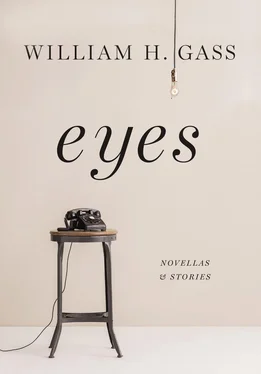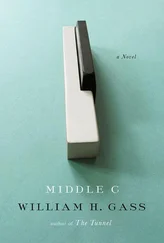The man who spoke with his hands had cheeks that were tanned; outside of those two places — the left and right cheeks at the lower edge of the bone — his skin was pale. His fingers were exceptionally white and consequently easy to see, which is possibly one reason why he decided to speak with his hands, although nobody supposed that he actually chose his gestures; what made them so graceful and attractive was that they (his fingers for the most part) seemed to dance outside the range of their owner’s attention. It is no longer fashionable to describe anything as “unconscious.” The few who still employ the concept have probably been smoking too much Freud. Freud had a cigar habit, and we know it was bad because it killed him.
The man who spoke with his hands would, while speaking, sometimes move the thumb of his right hand gently (one might say with circumspection) back and forth, in and out, of a hollow formed by a downward curl of the left hand’s lengthy fingers, as if they were lightly gripping a pole where the thumb slid. Professors Rinse and Paltry understood this to be a meditative moment; for instance, if he were saying that he hadn’t taken any of the students in his History of Religious Music class to hear some famous organist who had come to Columbus yet again this year (it was the sixth occasion), they would take his hands to be indicating that he had debated long and hard about it. As Professor Paltry saw the thumb glide gradually out again, he thought of the trombone. Freud would have ascribed this habit to another practice that was equally compulsive and otherwise unspeakable.
On the whole the man who spoke with his hands created movements that were slow, as if they were distant from his words, and reluctant to leap to conclusions. Only when his forefinger, seemingly held back by the pressure of the thumb, sprang forward in that snap one uses to flick a crumb from the dining cloth did they call attention to themselves. This gesture meant — the Professors believed — that whatever it was he was discussing — an event, a meeting, a class, an opinion — was over and done with, was no longer held by him, was not to be taken up again. When he said: I just couldn’t face another long bus ride with a load of noisy kids; there was neither snick nor snip, but a gentle, almost imperceptible movement of the fingertips, the nails in full view, as if brushing something away or warding it off, pushing the imagined thing out of his purview. Then he might conclude: so I didn’t. The snip would follow this.
A gentle brushing of a tabletop with the fingers will roll crumbs to the edge and over it onto a ready palm. There is no need to flick offending grains of salt or sugar into space where they will sand up something else — a chair seat or the floor beneath your feet. A table knife will scrape them to a corner and fancy folk or attentive waiters in hightoned restaurants employ a silver blade just for this purpose. So the flick is probably a bad habit too. The flick removes a problem from your presence but does not rid it from the world. Indeed, the cloth from which the crumbs have been so casually ushered remains stained and abused, and the gesture that removes these ashes and these cinders also signifies an intention to renew the table’s use as if it were new and its covering not in need of removal. Germs are not thusly scraped away and remain to infect the éclair and its brood.
The fingers of the man who spoke with his hands might mesh like the tines of forks, but gently and easily, for tines may jam. Then one could watch his fingers slide between his fingers like blending fans, again very gradually, so the hands were clasped, and almost immediately moved again, separating with the silence of cream, and thereby measuring degrees of commitment or withdrawal, of coolness or ardency, agreement or disavowal. His hands often assumed a prayerlike stance when he began to speak — pardon me, your humble servant, by your leave, sir — and then the right hand would withdraw, its fingers sliding very slowly down a calm left palm until the wrist was reached when they would hesitate a moment before rising up again or continue to drop on down to the wristband of their owner’s watch.
Yes, the man who spoke with his hands could be nervous and impatient too, the fingers of his right drumming on the back of his left. That tapping reminded Professors Paltry and Rinse of the way his long slim white fingers flew on and off the holes of the flute, whereas if the left danced a bit on the back of the right, it meant, they calculated, expectation coupled with serene acceptance. Occasionally both hands would droop from their wrists like fresh wash hung from a rope, but this was not a feminine gesture, even though Professors Rinse and Paltry judged it signified: you win, I give up, you don’t say. Unless, of course, the hands suddenly flew up again, when it meant a very firm: go away, take your topic elsewhere, little boy, run out and play.
When the man who spoke with his hands was confronting a knotty problem, or trying to be clear about a complexity that had hold of him, he would revolve his hands around one another, slowly or quickly, quietly or forcefully, as the puzzle was pursued. The knot at last untied, the left hand, palm exposed, might fly gracefully away as if to say: there, you see, or, it consequently comes to this. I liked particularly the definite but brief pinches one pair of fingers might make on a lower arm or the upper skin of a hand, or all the subtle tweezer-style variations, since he seemed to have a special role for every digit, and Professor Paltry particularly felt those fingers were very sincere about their business, well manicured and behaved, especially during geometric gestures, small circles mostly, as if one were twining one’s hair, or unrolling an idea like a length of rug.
Occasionally, the man who spoke with his hands would add a little flutter, or some zippy propulsion of the right indexical toward the object or person he was addressing (the way one adds “-ed” to a verb or tacks on “-ly” to an adverb or attaches an “-est” to an adjective or “-ness” to a noun of which “saintliness” could serve as an example, or “livelihood” be an attractive instance, or “implicational” at least representative), thereby altering the assumed character of a run of silent remarks.
Rarely did the man who spoke with his hands permit them to touch his head, ears, or face, though Professor Paltry saw a forefinger brush his earlobe once in a gesture so expressive as to warrant applause. They never strayed below the belt, or roamed far or widely from his torso, or fell meekly like a coat sleeve to his sides. And despite all of this nearly continuous motion, the Professors hardly noticed them; took little heed of this habit; were not distracted as much by the fingers as by the light which rollicked from their owner’s bald head, pale as paper. He was a man, compact and even slight, whom one could nevertheless pick out of a crowd as one would the most attractive piece of fruit from a bin. His hair would have been brown had he had any. The truth was, Rinse and Paltry talked more about the man’s dark curly eyebrows and his bald pate than his shiny nails or their scintillating moves.
When the man who spoke with his hands performed, his colleagues read his gestures as signs, and Rinse thought his fingers danced, but Paltry heard an orchestra that the man conducted to accompany his words. Paltry saw the pick, the drum, the strum, the tweak, the pluck, the rub, the damp, the trill, the run of the instruments, the strain of the strings, as the man’s nails flickered, and loose fists were formed only to relax like petals leaning back into their blooms.
Arthur Devise was the man who spoke with his hands, and he played the flute, the piccolo, and the recorder. When the death of Clarence Carfagno created an opening in the music department, Arthur Devise arrived to fill it. Professors Morton Rinse and Joseph Paltry held it against their new colleague that he had been chosen without consulting them; they held it against him that he was a friend of Howard Muffin, the President who had hired Art (as they would later affectionately address him), and a president whom the male faculty — to a man — despised; they held it against him that he was almost as old as they were and so as long a failure as they were (though they didn’t immediately put their animosity in such terms); they held it against him that, as a musician, he was quite accomplished; Professor Morton Rinse especially held it against him that he, like Rinse, played the flute, the piccolo, and the recorder; while both men held it against him that Muffin had picked Arthur Devise because the Department of Music had always — anyway in Paltry’s memory — had two members (there were three altogether) who professed the flute, the piccolo, and the recorder, and that it was proper to continue the tradition; the remainder held it against Arthur that he actually seemed a good sort and a wise choice, because they did not want to think the President ever acted wisely; Professor Joseph Paltry held it against Devise in addition that he was a widower with an attractive daughter about to become a student of music in her parent’s own college, in her parent’s department, and might enroll in her parent’s class; they jointly held it against him that Devise agreed to teach, lead, and pamper the choir and the chorus, and had them sounding splendid in no time; finally, they held it against him that he spoke with his hands, and that, at first, neither Rinse nor Paltry liked what he said.
Читать дальше












